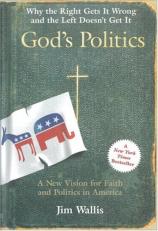Excerpt
Excerpt
God's Politics: Why the Right Gets It Wrong and the Left Doesn't Get It

Chapter One
Take Back the Faith
Co-opted by the Right, Dismissed by the Left
Many of us feel that our faith has been stolen, and it's time to take it back. In particular, an enormous public misrepresentation of Christianity has taken place. And because of an almost uniform media misperception, many people around the world now think Christian faith stands for political commitments that are almost the opposite of its true meaning. How did the faith of Jesus come to be known as pro-rich, pro-war, and only pro-American? What has happened here? And how do we get back to a historic, biblical, and genuinely evangelical faith rescued from its contemporary distortions? That rescue operation is even more crucial today, in the face of a deepening social crisis that cries out for more prophetic religion.
Of course, nobody can steal your personal faith; that's between you and God. The problem is in the political arena, where strident voices claim to represent Christians when they clearly don't speak for most of us. It's time to take back our faith in the public square, especially in a time when a more authentic social witness is desperately needed.
The religious and political Right gets the public meaning of religion mostly wrong -- preferring to focus only on sexual and cultural issues while ignoring the weightier matters of justice. And the secular Left doesn't seem to get the meaning and promise of faith for politics at all-mistakenly dismissing spirituality as irrelevant to social change. I actually happen to be conservative on issues of personal responsibility, the sacredness of human life, the reality of evil in our world, and the critical importance of individual character, parenting, and strong "family values." But the popular presentations of religion in our time (especially in the media) almost completely ignore the biblical vision of social justice and, even worse, dismiss such concerns as merely "left wing."
It is indeed time to take back our faith.
Take back our faith from whom? To be honest, the confusion comes from many sources. From religious right-wingers who claim to know God's political views on every issue, then ignore the subjects that God seems to care the most about. From pedophile priests and cover-up bishops who destroy lives and shame the church. From television preachers whose extravagant lifestyles and crass fund-raising tactics embarrass more Christians than they know. From liberal secularists who want to banish faith from public life and deny spiritual values to the soul of politics. And even from liberal theologians whose cultural conformity and creedal modernity serve to erode the foundations of historic biblical faith. From New Age philosophers who want to make Jesus into a nonthreatening spiritual guru. And from politicians who love to say how religious they are but utterly fail to apply the values of faith to their public leadership and political policies.
It's time to reassert and reclaim the gospel faith -- especially in our public life. When we do, we discover that faith challenges the powers that be to do justice for the poor, instead of preaching a "prosperity gospel" and supporting politicians who further enrich the wealthy We remember that faith hates violence and tries to reduce it and exerts a fundamental presumption against war, instead of justifying it in God's name. We see that faith creates community from racial, class, and gender divisions and prefers international community over nationalist religion, and we see that "God bless America" is found nowhere in the Bible. And we are reminded that faith regards matters such as the sacredness of life and family bonds as so important that they should never be used as ideological symbols or mere political pawns in partisan warfare.
The media like to say, "Oh, then you must be the religious Left?" No, not at all, and the very question is the problem. Just because a religious Right has fashioned itself for political power in one utterly predictable ideological guise does not mean that those who question this political seduction must be their opposite political counterpart. The best public contribution of religion is precisely not to be ideologically predictable or a loyal partisan. To always raise the moral issues of human rights, for example, will challenge both left and right-wing governments that put power above principles. Religious action is rooted in a much deeper place than "rights" -- that place being the image of God in every human being.
Similarly, when the poor are defended on moral or religious grounds, it is certainly not "class warfare," as the rich often charge, but rather a direct response to the overwhelming focus on the poor in the Scriptures, which claim they are regularly neglected, exploited, and oppressed by wealthy elites, political rulers, and indifferent affluent populations. Those Scriptures don't simply endorse the social programs of the liberals or the conservatives, but they make it clear that poverty is indeed a religious issue, and the failure of political leaders to help uplift the poor will be judged a moral failing.
It is precisely because religion takes the problem of evil so seriously that it must always be suspicious of too much concentrated power -- politically and economically -- either in totalitarian regimes or in huge multinational corporations that now have more wealth and power than many governments. It is indeed our theology of evil that makes us strong proponents of both political and economic democracy -- not because people are so good, but because they often are not and need clear safeguards and strong systems of checks and balances to avoid the dangerous accumulations of power and wealth.
It's why we doubt the goodness of all superpowers and the righteousness of empires in any era, especially when their claims of inspiration and success invoke theology and the name of God. Given the human tendencies of military and political power for self-delusion and deception, is it any wonder that hardly a religious body in the world regards the ethics of unilateral and preemptive war as "just"?
God's Politics: Why the Right Gets It Wrong and the Left Doesn't Get It
- Genres: Christian, Current Affairs, Religion
- hardcover: 384 pages
- Publisher: HarperSanFransisco
- ISBN-10: 0060558288
- ISBN-13: 9780060558284




